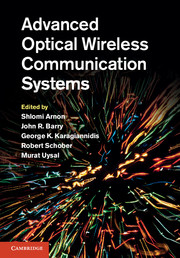Book contents
- Frontmatter
- Contents
- List of contributors
- Part I Outlook
- Part II Optical wireless communication theory
- 2 Coded modulation techniques for optical wireless channels
- 3 Wireless optical CDMA communication systems
- 4 Pointing error statistics
- 5 Equalization and Markov chains in cloud channel
- 6 Multiple-input multiple-output techniques for indoor optical wireless communications
- 7 Channel capacity
- Part III Unique channels
- Part IV Applications
- Index
5 - Equalization and Markov chains in cloud channel
from Part II - Optical wireless communication theory
Published online by Cambridge University Press: 05 June 2012
- Frontmatter
- Contents
- List of contributors
- Part I Outlook
- Part II Optical wireless communication theory
- 2 Coded modulation techniques for optical wireless channels
- 3 Wireless optical CDMA communication systems
- 4 Pointing error statistics
- 5 Equalization and Markov chains in cloud channel
- 6 Multiple-input multiple-output techniques for indoor optical wireless communications
- 7 Channel capacity
- Part III Unique channels
- Part IV Applications
- Index
Summary
Abstract: Free-space optical (FSO) communications is a practical solution for creating at three-dimensional global broadband communications grid, offering bandwidths far beyond those possible in Radio Frequency (RF) range. However, attributes of atmospheric turbulence and obscurants such as clouds impose perennial limitations on availability and reliability of optical links. To design and evaluate optimum transmission techniques that operate under realistic atmospheric conditions, a good understanding of the channel behavior is necessary.
In some prior works, the Monte Carlo ray tracing (MCRT) algorithm has been used to analyze the channel behavior. This task is quite numerically intensive. The focus of this chapter is on investigating the possibility of simplifying this task by a direct extraction of state transition matrices associated with standard Markov modeling from the MCRT computer simulations programs. We show that by tracing a photon's trajectory in space via a Markov chain model, the angular distribution can be calculated by simple matrix multiplications. We also demonstrate that the new approach produces results that are close to those obtained by MCRT and other known methods. Furthermore, considering the fact that angular, spatial, and temporal distributions of energy are interrelated, mixing time of Monte Carlo Markov chain (MCMC) for different types of aerosols is calculated based on eigen-analysis of the state transition matrix and possibility of communications in scattering media is investigated. We also consider in this chapter signal processing techniques for airborne FSO wireless communications through clouds. The FSO channel is known to be accompanied by multi-scattering, which causes severe inter-symbol interference in digital transmissions at high data rates.
Information
- Type
- Chapter
- Information
- Advanced Optical Wireless Communication Systems , pp. 90 - 115Publisher: Cambridge University PressPrint publication year: 2012
Accessibility standard: Unknown
Why this information is here
This section outlines the accessibility features of this content - including support for screen readers, full keyboard navigation and high-contrast display options. This may not be relevant for you.Accessibility Information
- 1
- Cited by
